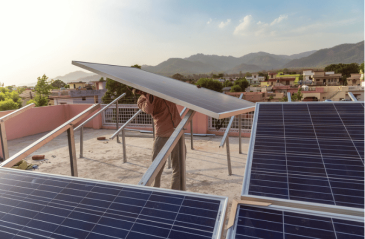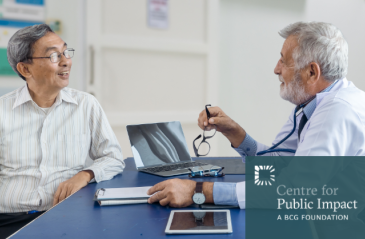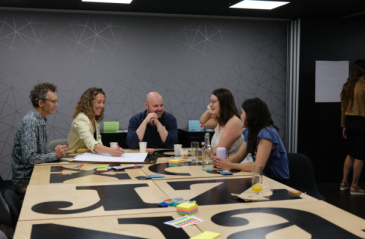
The power of storytelling in climate leadership

Jim Kim: 'We are not the organisation that says it should be growth at all costs'
Share articleJim Kim: 'There is a lot of speculation about the impact of automation on low-skilled jobs'
Share articleJim Kim: 'We are going to use all our resources to help resilience to the great global threats'
Share articleWe put our vision for government into practice through learning partner projects that align with our values and help reimagine government so that it works for everyone.
Development cuts deeply through Jim Kim's DNA. Although a medical doctor and anthropologist by training, his is a career steeped in the gritty reality of helping people in developing countries progress and move forward.
A former director of the HIV/AIDS Department at the World Health Organization, he is also co-founder of Partners in Health, an organisation dedicated to treating poor people in Haiti, Peru, Rwanda and other developing countries. Since 2012 he has been serving as president of the World Bank Group (WBG), the world's largest development agency, and was recently reinstalled for a second four-year term. No cautious approach here, instead he is aiming high: ending extreme poverty by 2030 and boosting shared prosperity for the bottom 40% of the population in developing countries. These are his north stars.
"These two goals guide everything we do and the three ways to get there - grow the economy, invest in people and build resilience to the greatest threats," he says. So how's he getting on?
Established in 1944, the WBG is a source of financial and technical assistance to developing countries around the world. It provides low-interest loans, interest-free credits, and grants to developing countries. This funding goes towards investments in sectors that include health, education and - increasingly - the environment. The WBG, which also offers support through policy advice, research and analysis, and technical assistance, binds these priorities together by ensuring a focus on inclusive economic growth.
"We are not the organisation that says it should be growth at all costs," he points out. "We are specifically looking at ways of investing in areas that are job-rich. For example, new roads that link farmers to markets have had a hugely positive impact on poverty." Such funding, or "official development assistance", remains crucial, but he goes on to point out that there is no endless supply of financial resources.
"It used to be - maybe 25 years ago - that many development players talked about a lack of absorption capacity; they had all this money but nowhere to put it," he recalls. "But now, the absorption capacity far outweighs our ability to provide aid. But we are working in any way that we can to take advantage of the current situation, which is that there are 100 trillion dollars of investment funds out there, with 12 trillion dollars in sovereign funds sitting in negative interest rate bonds. This means there is capital that is earning very little because of low interest rates and the unconventional monetary policies that are in place. We think there is a tremendous opportunity to bring some of this capital off the sidelines and invest it in things like roads, energy and ports: the things that have traditionally provided the inputs for economic growth."
Inclusive growth, however, is only one part of the story. As befits a former anthropologist who heads up a workforce of well over 10,000 staff in over 120 offices worldwide, Dr Kim places huge emphasis on investing in people. "There is a lot of speculation about what is going to happen to low-skilled jobs as a result of automation," he explains. "And based on our own data, The Economist magazine and others have put numbers on the table like 69% of currently existing jobs in India, 77% of currently existing jobs in China, 85% of currently existing jobs in Ethiopia are going to be lost because of automation. I have been arguing for dramatically scaled-up investment in human beings for most of my adult life, but now I think that the rationale for doing it from an economic perspective is stronger than it has ever been."
These profound changes have prompted the WBG to spearhead a fresh drive to ensure that people's skills are front and centre in any future economic plan. "We are really pushing the notion that if you're going to be prepared for the economy of the future then you have to dramatically scale up your investment in human beings," he adds. "This starts from early childhood, and one of the things we pointed out in our poverty and inequality report is that investments in early childhood are critical and are amongst the highest returning investments you can make. And we are very clear in the report that better healthcare and better education are also very important ways of fostering more inclusive economic growth."
However, he goes on to say that investing in people only happens when the necessary infrastructure is in place to support it. "The trend that we've always seen is that unless leaders are convinced that there is going to be investment in infrastructure, they are not going to use our resources to invest in human beings - they need the hard infrastructure first," he admits. "This is why we have to work so hard to crowd in the private sector and make sure the investments are happening. Then I think we can make the stronger argument that whatever finances are available should be invested more aggressively in human beings."
The final pillar of activity for Dr Kim and his colleagues is centred on the gravest global public risks - meaning pandemics, climate change and forced displacement. For example, as the scale of the 2014 Ebola outbreak emerged, he was among the first to voice his concern about the need to quicken the pace of the response. The WBG rapidly deployed a US$400m package (one of the largest sums from any donor) to help countries in Africa minimise the economic impact of the disease.
"We are going to continue to use all of our resources - whether it is financing, other kinds of financial tools or whether it is knowledge - to try and help build resilience to the great global threats," he says. "For pandemics we have developed a new system of insurance and bonds that will assure the poorest countries of immediate financing when a pandemic hits. And we are trying to be as creative as we can be to help both the middle-income and the poorest countries when they are facing the problem of forced displacement and refugees."
But climate change is what he is "most worried" about right now. "The last 16 months have each been the hottest on record - everything is happening more quickly than we thought," he admits. "We were all very happy to see COP21 come into force, but we believe we have to move very quickly and we have promised to put 28% of our resources - a total of 30 billion dollars a year - into climate change related activities."
A good example of this is its one-stop shop solution - Scaling Solar - which does everything from policy advice to risk management, with the ultimate aim of making privately funded, grid-connected solar projects operational within two years and at competitive tariffs. "It's better for the environment, less expensive and we can get it out to the rural villages much faster than more traditional fossil fuels," he says.
It is clear that the WBG has much on its plate, but Dr Kim believes that the lofty goals the institution has set are far from a pipe dream. While progress is tracked by his President's Delivery Unit, he is also seeking to highlight stories of positive impact and where governments are performing well. "We think it is really important to highlight examples of governments that have actually gotten better, and then to spread the practical knowledge of how to improve governance throughout the world," he explains.
"This is going to be the focus of our next governance report. We have a large governance unit and we know that good governance is critical to many things, including economic growth, but just about every government knows that the demand for better service delivery is there in every single society. And so we are very much focusing on practical ways to help governments do the things they need to do and help this transition to a more practical approach."
At the end of the day it is about outcomes: lifting people out of poverty and improving lives worldwide. This is the mission that drives Dr Kim and will continue to fuel his and the WBG's progress over the next four years - how they get on will be of interest to all of us, wherever we are in the world.











